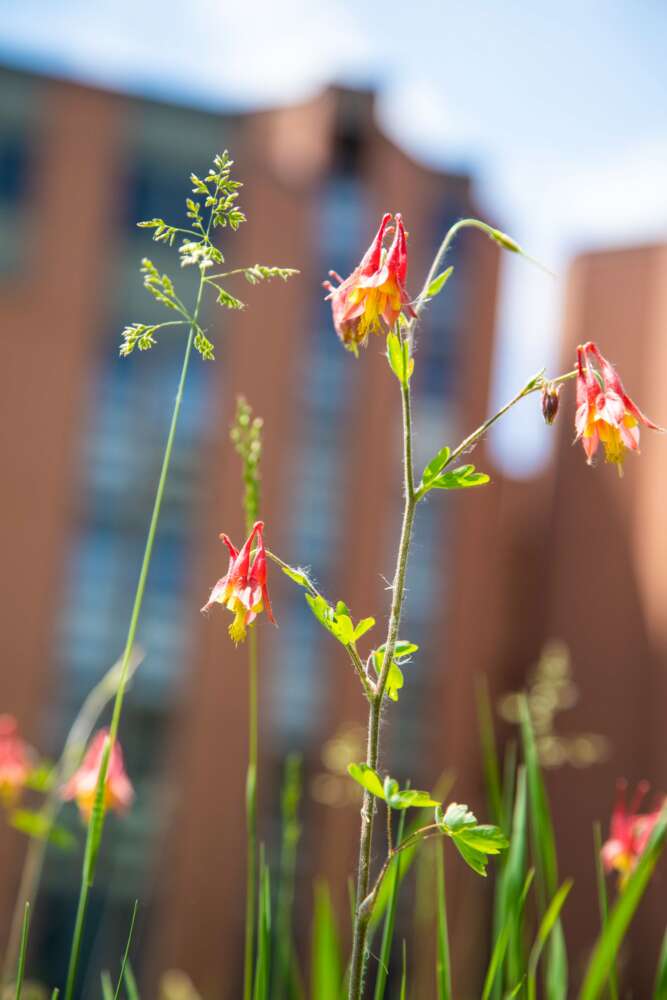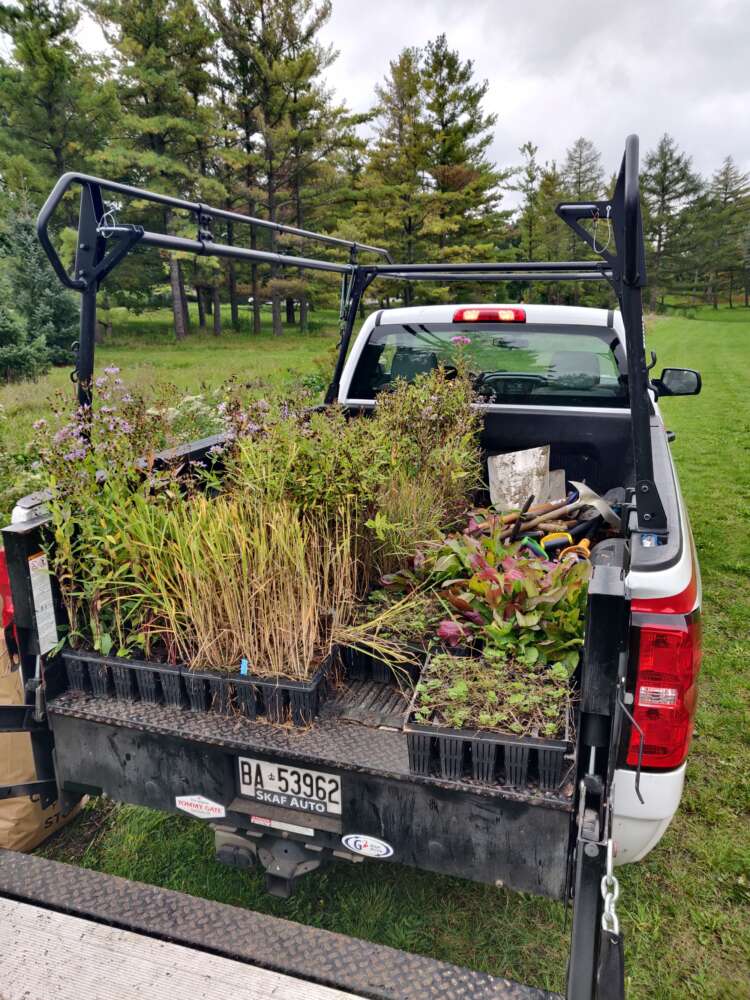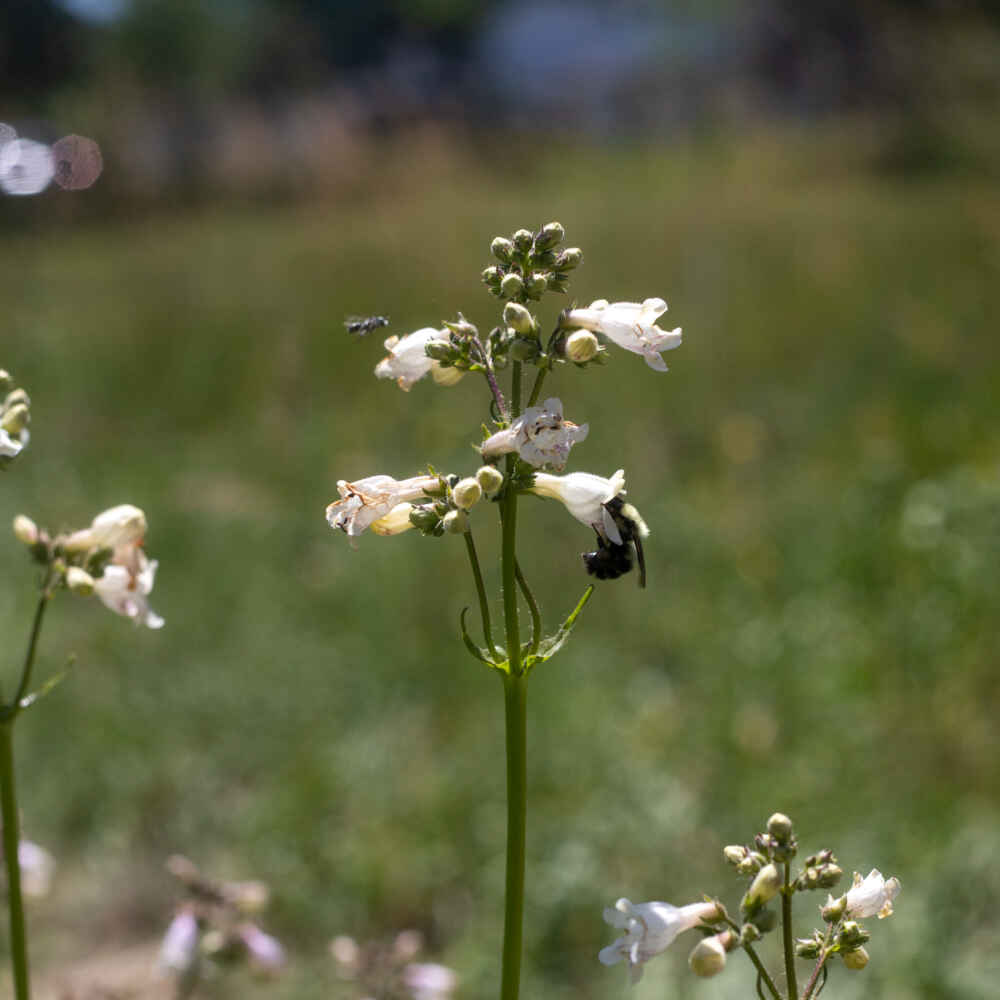If a passerby looks to the South Residences on Stone Road, they see a pine forest. Hiding from view, nestled in just behind the trees, sits a legacy project for the community and pollinators.
That project is a seed orchard that is run and developed by the University of Guelph’s Sustainability Office, as part of the Guelph Campus Conservation Program (GCCP).
Sage Handler helped launch the orchard in 2018 as an environmental science student. As part of her bachelor’s degree thesis, she identified areas on campus where there weren’t enough resources for native pollinators. One of the areas was the strip of land behind the South Residences.
“The space was glaringly obvious as a place that was lacking, but that also had huge potential,” said Handler. “It was just kind of wasted because it wasn’t being used for anything.”

At the same time, Brandon Raco, U of G’s sustainability manager, was considering the space for a milkweed meadow. He was already talking to Handler’s supervisor, Dr. Nigel Raine, about on-campus pollinator projects, since U of G is a designated bee-friendly campus and, thus, committed to creating more landscapes beneficial for pollinators.
Fast forward to 2019, when the Sustainability Office received its first Go Wild grant from WWF-Canada, of which U of G is also a Living Planet @ Campus partner. Because of Handler’s research, the location behind the South Residences was chosen, said Samantha Casey, communications and engagement coordinator for U of G’s Sustainability Office.
Converting the space into a pollinator garden reduced the need for mowing and other maintenance, provided a natural space for students, and created a corridor between the Arboretum and the DM Rutherford Conservatory gardens for wildlife, said Handler, who completed her master’s degree at U of G last month.
The gardens are now thriving, restoring urban biodiversity, improving pollinator health and helping return U of G’s campus to the healthy and resilient ecosystem it once was.
“We’re letting the space dedicated for the garden and orchard naturalize by planting native plants through the space. We’ve to date planted well over 600 native plants there with hopes for them to continue to grow and flourish,” said Casey. “This was made possible from support from WWF-Canada through the two Go Wild Grants and the Seed Orchard funding.”
To successfully restore the natural landscape to this area of the U of G campus, locally sourced native plants were needed, which is where a seed orchard comes in.
Orchards are not made up of just trees
A seed orchard is a garden with the specific purpose of growing plants to harvest and distribute their seeds, said Ryan Godfrey, a specialist in community action for WWF-Canada’s restoration and regeneration team.
To start a seed orchard, it is important to start with plants grown from wild seeds collected locally and ethically, he explained in an article for WWF-Canada.
“The range of native species could extend quite far from the actual planting or restoration site, but seed collected locally will be well-adapted to local conditions,” he added.
Once those plants mature, they can provide a steady provision of seeds needed to transform landscapes back to their natural states, eliminating the need for restoration teams to go back in and potentially damage the wild plant’s habitat. Those benefits are exactly what U of G’s seed orchard provides, making it essential to the native pollinator gardens’ success.
A three-pronged approach to serve the community

The Sustainability Office started its seed orchard because of its commitment to creating beneficial landscapes for pollinators through the University’s bee campus designation.
“And then perfect timing, because we actually had the two pollinator gardens established when WWF-Canada reached out about supporting us with the creation of a seed orchard,” said Casey.
WWF-Canada provided the Sustainability Office with a $6,000 grant in 2021, as part of its Seed Orchards Project. It started, Godfrey said, because he frequently heard concerns over a lack of native plants for large-scale restoration projects which was “echoed over and over again” throughout his work in Canada and the U.S.
U of G was one of 10 organizations WWF-Canada chose for the project because of their relationship with the University. To use its grant, the Sustainability Office employed a three-pronged approach.
The first is to maintain and care for the half-planted orchard, while also collecting the plants’ seeds with the help of GCCP volunteers. Throughout the spring and summer, species like common milkweed, early goldenrod and pale-purple coneflower all sourced from local Ontario Native Plant Growers Association nurseries will be planted.
In the fall, when the plants go to seed, the Sustainability Office will collect and pot the seeds, with the hope of overwintering them in the Edmund C. Bovey Building greenhouses, which are uniquely situated for growing native plants.
The larger goal is to collect enough seeds for a U of G community seed library – the second prong.
“If we get some seeds, we can save and store them properly,” said Casey. “Then in the spring, if folks want to switch out the seeds they have, and they have seeds they’re willing to donate, they can take some.”
One-third of the collected seeds will be donated to local ecosystem restoration projects – the third prong of the approach, still being planned.
Pollinators play key role in numerous crops

The success of the seed orchard and native pollinator gardens depends on the very wildlife they seek to serve. Pollinators play a key role in producing numerous crops while helping to prevent soil erosion and increase carbon sequestration.
Their contributions, however, are often overlooked, which is why June plays host to National Pollinator Week, June 20-26. The week serves to raise awareness of how to protect pollinators, something U of G is committed to because of its bee campus designation.
In some ways, it’s also a celebration of the work to create the legacy project.
“The collaborative nature of the project was just so inspiring,” said Handler. “It was really cool to work with so many people for a common goal.”
Contact:
Samantha Casey
scasey01@pr.uoguelph.ca
